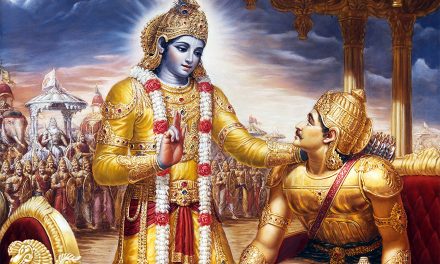tatrāpaśyat sthitān pārthaḥ
pitṝn atha pitāmahān
ācāryān mātulān bhrātṝn
putrān pautrān sakhīḿs tathā
śvaśurān suhṛdaś caiva
senayor ubhayor api
Translation of Bhagavad Gita 1.26
There Arjuna could see, within the midst of the armies of both parties, his fathers, grandfathers, teachers, maternal uncles, brothers, sons, grandsons, friends, and also his fathers-in-law and well-wishers.
Commentary by Sri A.C. Bhaktivedanta Swami Prabhupada of Gaudiya Sampradaya:
On the battlefield Arjuna could see all kinds of relatives. He could see persons like Bhurisrava, who were his father’s contemporaries, grandfathers Bhishma and Somadatta, teachers like Dronacarya and Kripacarya, maternal uncles like Salya and Shakuni, brothers like Duryodhana, sons like Laksmana, friends like Asvatthama, well-wishers like Kritavarma, etc. He could see also the armies which contained many of his friends.
Commentary by Sri Vishvanatha Chakravarthi Thakur of Gaudiya Sampradaya:
Putra and pautra refer to the sons and grandsons of Duryodhana and others on the opposing side.
Commentary by Sri Ramanuja of Sri Sampradaya:
1.26 – 1.47 Arjuna said — Sanjaya said — Sanjaya continued: The high-minded Arjuna, extremely kind, deeply friendly, and supremely righteous, having brothers like himself, though repeatedly deceived by the treacherous attempts of your people like burning in the lac-house etc., and therefore fit to be killed by him with the help of the Supreme Person, nevertheless said, ‘I will not fight.’ He felt weak, overcome as he was by his love and extreme compassion for his relatives. He was also filled with fear, not knowing what was righteous and what unrighteous. His mind was tortured by grief, because of the thought of future separation from his relations. So he threw away his bow and arrow and sat on the chariot as if to fast to death.
The Supreme Lord Krishna, Hrsikesa, the master of the senses. The Supreme Controller, internally and externally of all living entities evolving and evolved. Who although the Supreme Lord of all, yet descended down to Earth out of His causeless mercy for the redemption of the faithful and even more, He condescended to be Arjuna’s chariot driver, carrying out his wish to station their chariot in such a commanding position as to be able to readily view the belligerent Kauravas and put within the range of his vision such heroes as Bhishmadeva, Dronacarya and Kripa and the Kings of royal dynasties. At that time the Supreme Lord Krishna said to Arjuna: see what chances there are for the Kauravas victory over thee.
Commentary by Sri Sridhara Swami of Rudra Sampradaya:
What happened after that? To answer this the verse states: There he saw fathers, uncles, sons and grandsons; that is to say the sons and grandsons of Duryodhana and others as well as associates, friends, and well wishers who had rendered some favour in the past.
Commentary by Sri Madhvacharya of Brahma Sampradaya:
Sri Madhvacharya did not comment on this sloka.
Commentary by Sri Keshava Kashmiri of Kumara Sampradaya:
Arjuna saw so many of his friends and associates opposing him in battle. It should be understood that those mentioned as fathers are ones who were from the same generation as his father such as Bhurisrava and those grandfathers are similarly from the same generation as his grandfather such as Bhishma. The teachers referred to are like Drona and Kripa, maternal uncles are like Salya, brothers are like Bhima and Duryodhana, sons are like the age of his own son Abhimanyu, grandsons are like Laksmana and friends are like Asvatthama as well as others.
Commentary by Sri Adi Shankaracharya of Advaita Sampradaya:
1.26 Sri Sankaracharya did not comment on this sloka. The commentary starts from 2.10.
Commentary by Sri Abhinavagupta of Kaula Tantra Sampradaya:
1.12 — 1.29 Sri Abhinavgupta did not comment upon this sloka.
Sanskrit Shloka Without Transliteration Marks:
tatrapasyat sthitan parthah
pitrn atha pitamahan
acaryan matulan bhratrn
putran pautran sakhims tatha
svasuran suhrdas caiva
senayor ubhayor api
Sanskrit to English Word for Word Meanings:
tatra — there; apaśyat — he could see; sthitān — standing; pārthaḥ — Arjuna; pitṝn — fathers; atha — also; pitāmahān — grandfathers; ācāryān — teachers; mātulān — maternal uncles; bhrātṝn — brothers; putrān — sons; pautrān — grandsons; sakhīn — friends; tathā — too; śvaśurān — fathers-in-law; suhṛdaḥ — well-wishers; ca — also; eva — certainly; senayoḥ — of the armies; ubhayoḥ — of both parties; api — including.







